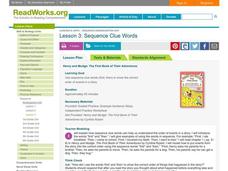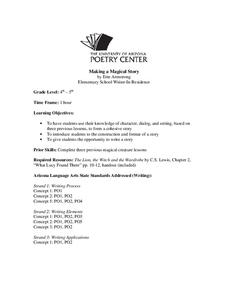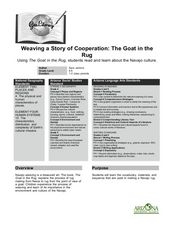Do2Learn
Sequencing Chart
Take note of events in a story with this organizer. Learners write down the who, what, where, and when, writing down four events in the order that they occur.
Do2Learn
Story Organizer
Kids can get all their plot points in line by filling out this graphic organizer with information from a story they have read. Pupils note down the title and author, the characters, the setting, and four events from the story.
Curriculum Corner
Book Study: The Polar Express
All aboard! Pair a reading of The Polar Express by Chris Van Allsburg with a set of literacy activities. The packet of worksheets includes task cards, sorting activities, a synonym match, comparing and contrasting activities, writing...
IPDAE
Themes in Short Stories
"What is the theme of this story?" The very question can spark fear in the minds of readers and incinerate confidence. Here you will discover an exercise that shows how writers use the tools of setting, plot, conflict, and...
EngageNY
Creating Division Stories
Create your own adventure story ... well, not really. The fifth lesson in a 21-part series has pairs create story contexts for division problems. The lesson presents a step-by-step process for pupils to follow in writing such stories.
Houghton Mifflin Harcourt
American Stories: Extra Support Lessons (Theme 2)
Here's a packet designed especially for those kids who need extra support with the basic concepts in the Houghton Mifflin Harcourt thematic units on American stories.
Curated OER
Marking Time
Two narrative excerpts tell the same story from different points of view. In the first excerpt (first person), sequencing words and phrases are bolded and learners write down what the bold type does. The second excerpt is in third...
Scholastic
A Tale to Tell!
A creative spin occurs when one pupil acts as author Ann M. Martin. Using a Q & A at the back of her book A Dog's Life, other classmates ask the "author" questions. They discuss the reasons why they know the book is from a...
Curated OER
Theatrical Economics
Read then role-play the characters from story of If You Give A Pig a Pancake. Young actors use improvisation and characterization to create the characters from the story. They will also write and role play original version of the story...
Curated OER
Lesson 3: Exception Questions in Stories with a Flashback
Fourth graders respond to a text using textual evidence to support their answers to questions. Students observe the teacher model a quick warm up on the chronological sequence of events from the passage, Leaving Home. In this literacy...
Curated OER
Sequence Clue Words
Young learners use sequence words to describe pictures they draw of events happening in a story. To practice sequencing events, they use words such as first, then, next, and more.
Curated OER
Elmer by David McKee
Students explore individual differences. For this literacy and self-esteem lesson, students listen to the story Elmo by David McKee, then describe what characteristics make Elmo special. Students complete a T chart showing how Elmo...
PBS
The Little Red Hen: A Tale of Cooperation
Ensure that your kids don't even consider saying "Not me!" when it comes time to read by engaging them in this set of lesson plans based around "The Little Red Hen." The class reads the story together before starting in on additional...
Kiwi Crate
Story Cards
Inspire your class to tell some creative stories with a series of story cards. They arrange cards that feature pictures of various items (a robot, a jeep, a ladybug, etc.) and narrate a story about each item.
Curated OER
One * Two * Three * Story
Second graders explore sequencing by drawing events of a story in order. In this sequence of events lesson, 2nd graders are read a story such as "The 3 Little Pigs", they recall the events from the fairy tale in order, visit an...
Curated OER
Sequencing: Pictures Tell a Story
Students listen to a story and observe five illustrations of the main events drawn by the teacher. They arrange the illustrations in sequential order. Then, working in groups of five, they read stories and select five events, one for...
Curated OER
Body Sequencing
Fifth graders listen to a story told by their teacher. They have cards of all of the events in the story. They must "jump" into the correct order of events.
Curated OER
It's Not Just Story Time... It's Learning Time!
Students look at picture books and describe the story elements. In this picture book lesson, students retell a story and begin to understand the story elements of plot, setting, and characters. Students complete graphic organizers to...
Curated OER
Write Me a Story
Second graders use the writing process and submit a story to www.kids.com. In this story writing lesson, 2nd graders choose a topic for a story contest. Students develop their stories. Students complete a her prewriting organizer....
Curated OER
Story Elements
Third graders identify story elements. In this story elements lesson, 3rd graders look at main idea, characters, point of view, theme and setting. They create a five paneled comic strip from a book.
Curated OER
The "Write" Stuff: Strategies and Conventions for Imaginative Writing
A comprehensive and immersive series of lessons that examines various aspects of story development leads learners into writing a narrative of their own. Writers develop an understanding of the writing process as they use the learning...
Curated OER
Making a Magical Story
Fourth and fifth graders use their knowledge of developing character, dialogue, and setting to produce an original story. An excerpt from The Lion, The Witch, and The Wardrobe is used as inspiration to get everyone's creative juices...
Curated OER
Weaving a Story of Cooperation: The Goat in the Rug
Weaving is an important part of Navajo culture. Read The Goat in the Rug to your fourth and fifth graders, and give them a glimpse into the process of rug making from the point of view of a goat! They will learn new vocabulary words and...
Curated OER
Problem Solving: Draw a Diagram
This problem solving PowerPoint presents a detailed, logical sequence of steps to follow in order to solve a story problem. The thinking processes described are given in text and represented by a visual model. After discussing the...
Other popular searches
- Story Sequencing
- Story Sequencing Worksheets
- Picture Story Sequencing
- Story Sequencing Halloween
- Story Sequencing Activities
- Story Sequencing Rubric
- Sequencing Story Events
- Short Story Sequencing
- Story Sequencing Exercises
- Story Sequencing Pictures
- Story Sequencing Map
- Story Sequencing Lessons

























